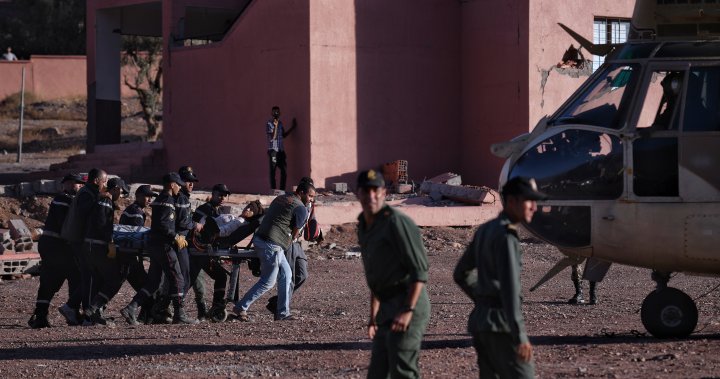Many survivors of Morocco’s most powerful earthquake in over a century are currently struggling in makeshift shelters. They have been outside for four nights, as rescuers have yet to reach remote mountain villages that experienced some of the worst devastation. The death toll from the 6.8 magnitude quake currently stands at 2,862, with 2,562 people injured, but these figures are expected to rise.
Rescue teams from countries such as Spain, Britain, and Qatar are assisting Morocco’s search efforts, while Italy, Belgium, France, and Germany have offered aid that has yet to be approved. The chances of finding survivors under the rubble are diminishing, especially because many of the traditional mud brick houses in the mountain villages collapsed without leaving air pockets.
The worst-hit area is situated in rugged and isolated terrain, leading to a varied response. Some organized tent camps have been established and supplies are being airlifted in, but aid has yet to reach other locations due to blocked roads. Many survivors have sought refuge along the Tizi n’Test road, which connects remote valleys to Marrakech. However, authorities are primarily focusing on larger communities, neglecting the remote villages that have been hit the hardest.
Numerous villagers have been left without power or telephone network since the earthquake struck. They have had to rescue loved ones and retrieve dead bodies buried under rubble without any assistance. However, there are also individuals like Brahim Daldali, who personally volunteered to help and distribute food, water, clothes, and blankets donated by friends.
The quake caused damage to historical buildings in Marrakech, including the Tinmel Mosque. However, the more modern parts of the city, including a site near the airport earmarked for IMF and World Bank meetings, were largely unscathed. The Moroccan government intends for these meetings to proceed, given that over 10,000 people are expected to attend.
Morocco has accepted aid from countries such as Spain, Britain, the United Arab Emirates, and Qatar. Algeria has allocated three planes to transport rescue personnel and aid. Italy, Belgium, France, and Germany have also offered assistance, but Morocco has yet to accept their offers. The Moroccan government is being cautious in accepting bilateral support offers and is prioritizing search and rescue efforts before this window of opportunity closes.
Caroline Holt, the global director of operations at the IFRC, commended Morocco’s careful approach in accepting aid. However, organizations like Rescuers Without Borders have expressed frustration at not being allowed to help. They have offered their support but have received no response from the Moroccan embassy.
Denial of responsibility! Vigour Times is an automatic aggregator of Global media. In each content, the hyperlink to the primary source is specified. All trademarks belong to their rightful owners, and all materials to their authors. For any complaint, please reach us at – [email protected]. We will take necessary action within 24 hours.


